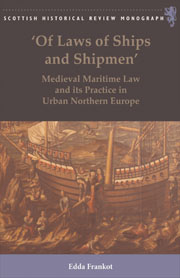Book contents
- Frontmatter
- Contents
- Tables and Maps
- Abbreviations
- Acknowledgements
- Preface
- Introduction
- 1 A History of Maritime Law in Northern Europe
- 2 Shipwreck, Jettison and Ship Collision in Maritime Law
- 3 The Five Towns Introduced
- 4 Written Law: Urban Collections of Sea Law
- 5 Written Law: Local Developments in Lawmaking
- 6 Legal Practice: the Administration of Maritime Justice
- 7 Legal Practice: Maritime Proceedings at the Urban Courts
- Final Conclusions
- Bibliography
- Index
5 - Written Law: Local Developments in Lawmaking
Published online by Cambridge University Press: 05 August 2013
- Frontmatter
- Contents
- Tables and Maps
- Abbreviations
- Acknowledgements
- Preface
- Introduction
- 1 A History of Maritime Law in Northern Europe
- 2 Shipwreck, Jettison and Ship Collision in Maritime Law
- 3 The Five Towns Introduced
- 4 Written Law: Urban Collections of Sea Law
- 5 Written Law: Local Developments in Lawmaking
- 6 Legal Practice: the Administration of Maritime Justice
- 7 Legal Practice: Maritime Proceedings at the Urban Courts
- Final Conclusions
- Bibliography
- Index
Summary
As the Scottish translations of the Rôles d'Oléron have never before been studied, these texts will be analysed in some detail in this chapter in order to establish, first, whether they were translated from the French or the Flemish; second, whether there were several translations into Scots; and, finally, whether the Scottish texts are faithful translations of the original or whether significant changes were made which may suggest local variations in the customs contained in the Rôles d'Oléron. Given that local developments did take place in Kampen, Lübeck and Danzig, where sea laws were drawn up whose use remained for the most part restricted to these towns, some attempt is necessary to determine whether the contents of these laws were influenced by legal developments elsewhere, or vice versa. The Kampen Town Law, the Lübeck Sea Law and the Danzig judgements will be compared to the laws considered closest to them, that is to say the Ordinancie, the Hamburg Ship Law and the Waterrecht respectively. As regards Lübeck and Danzig, the other laws that originated in these towns will also be considered. A comparison of the individual developments of these three towns will subsequently help to explain the different ways in which the town councils utilised other laws or were influenced by developments elsewhere to create their own sea law collections.
- Type
- Chapter
- Information
- Of Laws of Ships and ShipmenMedieval Maritime Law and its Practice in Urban Northern Europe, pp. 110 - 143Publisher: Edinburgh University PressPrint publication year: 2012



